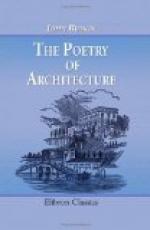86. Now, first, let us consider what sort of feeling this green country excites; and, in order to do so, be it observed, that anything which is apparently enduring and unchangeable gives us an impression rather of future, than of past, duration of existence; but anything which being perishable, and from its nature subject to change, has yet existed to a great age, gives us an impression of antiquity, though, of course, none of stability. A mountain, for instance (not geologically speaking, for then the furrows on its brow give it age as visible as was ever wrinkled on human forehead, but considering it as it appears to ordinary eyes), appears to be beyond the influence of change: it does not put us in mind of its past existence, by showing us any of the effect of time upon itself; we do not feel that it is old, because it is not approaching any kind of death; it is a mass of unsentient undecaying matter, which, if we think about it, we discover must have existed for some time, but which does not tell this fact to our feelings, or, rather, which tells us of no time at which it came into existence; and therefore, gives us no standard by which to measure its age, which, unless measured, cannot be distinctly felt. But a very old forest tree is a thing subject to the same laws of nature as ourselves: it is an energetic being, liable to an approaching death; its age is written on every spray; and, because we see it is susceptible of life and annihilation, like our own, we imagine it must be capable of the same feelings, and possess the same faculties, and, above all others, memory: it is always telling us about the past, never pointing to the future; we appeal to it, as to a thing which has seen and felt during a life similar to our own, though of ten times its duration, and therefore receive from it a perpetual impression of antiquity. So again a ruined town gives us an impression of antiquity; the stones of which it is built, none; for their age is not written upon them.
87. This being the case, it is evident that the chief feeling induced by woody country is one of reverence for its antiquity. There is a quiet melancholy about the decay of the patriarchal trunks, which is enhanced by the green and elastic vigor of the young saplings; the noble form of the forest aisles, and the subdued light which penetrates their entangled boughs, combine to add to the impression; and the whole character of the scene is calculated to excite conservative feeling. The man who could remain a radical in a wood country is a disgrace to his species.
88. Now, this feeling of mixed melancholy and veneration is the one of all others which the modern cottage must not be allowed to violate. It may be fantastic or rich in detail; for the one character will make it look old-fashioned, and the other will assimilate with the intertwining of leaf and bough around it: but it must not be spruce, or natty, or very bright in color; and the older it looks the better.




